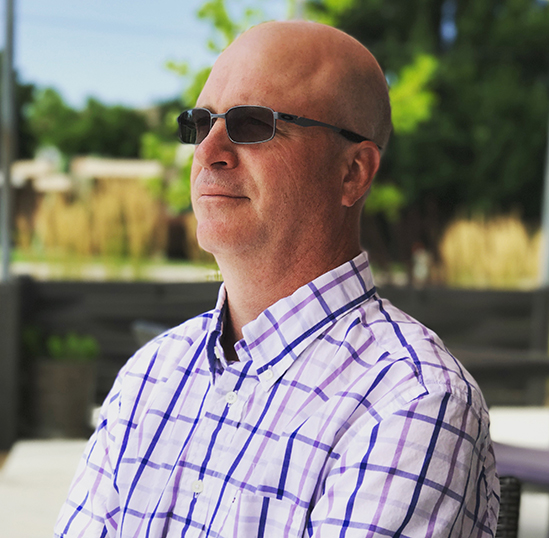St. Luke's team effort, wife's 911 call help save 'totally amazing' climber after stroke

Malcolm Daly had been in dire situations before.
A renowned mountain climber, Daly suffered frostbite and later lost a part of his leg after an accident in Alaska in 1999. He was stuck on mountain ledge for 48 hours while his climbing partner went for help.
In 2004, he suffered a heart attack while ice climbing in Ouray, Colo. Paramedics revived him after his heart had stopped.
Obviously, Daly and his wife, Karen, hoped his dramatic brushes with death were behind him.

But shortly after the couple moved to Hailey in April of 2020, Daly faced another dire situation. This time, the quick work and expertise of St. Luke’s staff members from Wood River to Boise helped save Daly’s life.
“They were amazing,” Karen Daly said.
She recently recalled the events of that day.
“Malcolm came home from riding his e-bike, and he went in to take a nap,” she said. “I was puttering around the other side of the house, and I heard this weird noise. (It was like) hiccups, but it wasn’t like any hiccups I’ve ever heard. They were so deep and so strong they sounded like he was whooping.”
Malcolm had suffered two minor strokes in the previous five years, but Karen knew immediately this one was more serious.
“He was unable to see me and unable to respond, and his whole right side was gone,” she said. “I called 911, and boy they were here in just minutes. They came in – police, fire, ambulance – and I said, ‘He’s having a stroke,’ and literally they just took him. They didn’t put in an IV or anything. They just took him and said, ‘Come to the ER.’”
Calling 911 instead of trying to drive Daly to the hospital was a vital step, as it allowed a quick response from the ambulance crew and for them to administer aid immediately. Approximately 1.9 million neurons are lost per minute during a stroke, aging the brain about three weeks each minute.

Karen gathered some of Malcolm’s belongings and allowed herself to calm down for a few minutes before driving to St. Luke’s Wood River Medical Center.
“They said they did (a) scan with new software and they knew they needed to get Malcolm to Boise,” Karen said. “… They were at top speed, and the nurse was just flying around. They wanted to get the clot busters started before he got in the helicopter.”
The software that was used to communicate with Boise is called the Rapid Mobile App. It allowed St. Luke’s neurointerventional surgeon Dr. Tony Bell to view the results from Daly’s CT scans on his mobile phone immediately, giving plenty of time to prepare for Daly’s arrival.
“When I got the call about Malcolm I knew it was imperative to get him to Boise quickly … you can tell by the parameters that are on the app – kind of in a general way – whether you have more or less time to get the clot out,” Dr. Bell said. “It’s always urgent, but sometimes it’s more urgent than others … and there was certainly some urgency with him.”
Daly was diagnosed with a National Institute of Health Stroke Scale score of 24.
“When you score a stroke there’s a scale from 0 to 42, with 0 being normal and 42 being the worst possible,” Dr. Bell said. “When he came out, he had a score of 2 and that was all related to his speech.”
Malcolm Daly continues to work on his speech and language skills, but in the meantime he’s back to his daily bicycle rides and continues to stay active and involved in a non-profit he co-founded. Paradox Sports helps grow climbing opportunities nationally for people with disabilities through the Adaptive Climbing Initiative.
“Obviously, we ended up with the best possible outcome for Malcolm,” Karen Daly said.
Karen said even despite the early scare, they've enjoyed their time in the Wood River Valley.

"Malcolm rides on his e-bike, a mountain bike, and we hike and fish."
Added Malcolm: "I love living here because we can do all those things right out of our house."
An avid climber himself, Dr. Bell realized once he spoke to Karen Daly, he realized he would be operating on “a guy who has been very influential in climbing.”
“The guy is a fiend, he’s totally amazing,” Dr. Bell said.
Dr. Bell credits Daly’s positive outcome to a St. Luke’s team that worked in unison, from the Wood River hospital to Air St. Luke’s to the neurointervention clinic in Boise.
He also credits the St. Luke’s administration for staying on top of the latest technology, including the Rapid Mobile App.
“Technology is constantly changing,” Dr. Bell said. “And St. Luke’s has done a very good job of keeping up with the latest technology. We, as physicians, feel like if there’s something that we feel strongly that we need to have then they get it for us. If it’s really going to make a difference in patient outcomes … they get it for us. St. Luke’s is very patient-centric.”
About The Author

Chris Langrill is a writer and copy editor for the St. Luke’s Communications and Marketing department.

